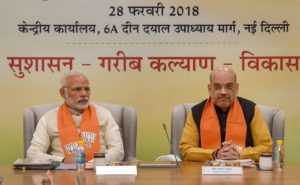Turn welfare scheme beneficiaries into voters

Narendra Modi, Amit Shah meet CMs, deputy CMs of BJP-ruled states at the party headquarters in New Delhi
With an eye on the general elections next year, the ruling Bharatiya Janata Party (BJP) wants to convert millions of beneficiaries of anti-poverty schemes into voters.
With less than eight months to go for the 2019 general elections, the ruling BJP has set an ambitious target of winning 350 seats. In the last Lok Sabha elections, BJP won 282 on its own and another 50 seats were added by the NDA partners. In 2014, the BJP won 190 out of a total of 207 seats in nine states, including all seats in Gujarat, Rajasthan, Delhi and Uttarakhand. It cannot do any better in these four states. In Uttar Pradesh, it won a phenomenal 71 out of 80 seats. However, it seems quite impossible to hold on to this number in the 2019 polls.
Prime Minister Narendra Modi and his confidante and BJP national president Amit Shah held a day-long brainstorming session for chief ministers and deputy chief ministers of the BJP-ruled states on August 28, at the multi-storey swanky party headquarters inaugurated in February this year.
The agenda for the meeting was a discussion on strategising for a series of state polls this year and the 2019 national election.
Who’s who of attendees?
Chief ministers who attended the meeting included-Assam’s Sarbananda Sonowal, Chhattisgarh’s Raman Singh, Haryana’s Manohar Lal Khattar, Himachal Pradesh’s Jai Ram Thakur, Jharkhand’s Raghubar Das, Madhya Pradesh’s Shivraj Singh Chouhan, Maharashtra’s Devendra Fadnavis, Manipur’s N Biren Singh, Rajasthan’s Vasundhara Raje, Tripura’s Biplab Kumar Deb, Uttarakhand’s Trivendra Singh Rawat and Uttar Pradesh’s Yogi Adityanath.
Among the deputy chief ministers who attended the meeting were Nitin Patel, Dinesh Sharma and Keshav Prasad Maurya from Uttar Pradesh and Sushil Modi from Bihar. Union home minister Rajnath Singh, finance minister Arun Jaitley and union minister for Road Transport & Highways, Shipping and Water Resources, Nitin Gadkari were also present.
First and foremost was the discussion on the internal survey conducted by the BJP and RSS in each of the BJP-ruled states and across the country. Also, on the table was the assessment of the chief ministers in terms of winning Lok Sabha seats in their states.
Significantly, what emerged from the marathon meeting was the mantra of converting the millions of beneficiaries of federal and state government schemes into voters in favour of the ruling BJP, by focussing on anti-poverty programmes, social justice, rural upliftment and women empowerment.
“We have taken a pledge that we will win the Lok Sabha polls with a majority greater than we had in the 2014 polls. We will also ensure our victory in three state polls,” Chhattisgarh chief minister Raman Singh asserted in a press conference.
Focus on federal government’s welfare schemes
Addressing the chief ministers, Modi asked to focus on the federal government’s welfare; pro-poor initiatives, such as the steep hike in minimum support price for crops; PM housing scheme; Ujjwala (LPG-cooking gas connections to individual households); and Saubhagya (electricity for all households). Also, the Prime Minister asked them to be prepared to implement the Ayushmaan Bharat-National Health Protection Scheme (AB-NHPS), which is dubbed as Modicare, to be launched by him on September 25 this year. The scheme will benefit 500 million citizens of the country.
The other pet project that Modi wished for the party to take to the masses is the ‘Swachh Bharat’ exercise. Under this scheme, the government has been building toilets and focussing on cleanliness, and the ongoing ‘Gram Swaraj’ project in over 48,000 villages.
The meeting discussed how to convert beneficiaries of central/state welfare schemes into voters for BJP. If the BJP is successful in doing so, it will return to power with a majority greater than 2014.
Modi also asked to highlight the achievements of the Centre and educate people about the benefits of seven key social welfare schemes of the NDA government. Dalits, OBCs and rural voters are the main sections being wooed by the party to add to its urban and upper caste vote base.
The leaders also discussed a comprehensive state-wise strategy for the upcoming polls in Rajasthan, Madhya Pradesh and Chhattisgarh. In the first two states, the BJP has been ruling for 15 years and will seek a fourth term. The party faces a strong anti-incumbency factor in all three.
While the welfare schemes and social justice plank will be a soft approach to woo voters, the BJP has decided to whip up the hard issues, such as driving out “illegal infiltrators” in Assam from Bangladesh, while also pushing for the contentious Citizenship Amendment Bill, 2016.
The party has been pushing for the Citizenship Amendment Bill, which grants citizenship to illegal migrants who are Hindus, Sikhs, Buddhists, Jains, Parsis and Christians from Afghanistan, Bangladesh and Pakistan, strategically leaving out Muslim immigrants.
As weeks go by, the political climate in India is likely to heat up ahead of the 2019 general elections.









